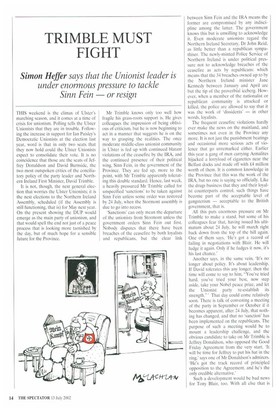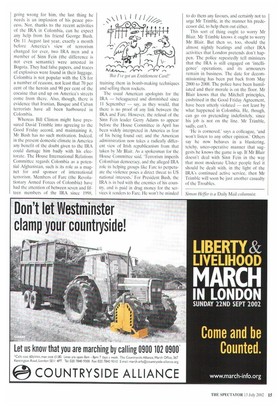TRIMBLE MUST FIGHT
Simon Heifer says that the Unionist leader is
under enormous pressure to tackle
Sinn Fein — or resign
THIS weekend is the climax of Ulster's marching season, and it comes at a time of crisis for unionism. Polling tells the Ulster Unionists that they are in trouble. Following the increase in support for Ian Paisley's Democratic Unionists at the election last year, word is that in only two seats that they now hold could the Ulster Unionists expect to consolidate their vote. It is no coincidence that those are the seats of Jeffrey Donaldson and David Burnside, the two most outspoken critics of the conciliatory policy of the party leader and Northern Ireland First Minister, David Trimble.
It is not, though, the next general election that worries the Ulster Unionists; it is the next elections to the Northern Ireland Assembly, scheduled (if the Assembly is still functioning, that is) for May next year. On the present showing the DUP would emerge as the main party of unionism, and that would spell the end not just of a peace process that is looking more tarnished by the day, but of much hope for a sensible future for the Province. Mr Trimble knows only too well how fragile his grass-roots support is. He gives colleagues the impression of being oblivious of criticism, but he is now beginning to act in a manner that suggests he is on the way to grasping the realities. The once moderate middle-class unionist community in Ulster is fed up with continued blatant violations of the ceasefire by the IRA, and the continued presence of their political wing, Sinn Fein. in the government of the Province. They are fed up, more to the point. with Mr Trimble apparently tolerating this double standard. Hence, last week, a heavily pressured Mr Trimble called for unspecified 'sanctions' to be taken against Sinn Fein unless some order was restored by 24 July, when the Stormont assembly is due to go into recess.
'Sanctions' can only mean the departure of the unionists from Stormont unless the government orders Sinn Fein out first. Nobody disputes that there have been breaches of the ceasefire by both loyalists and republicans, but the clear link
between Sinn Fein and the IRA means the former are compromised by any indiscipline among the latter. The government knows this but is unwilling to acknowledge it. Even moderate unionists regard the Northern Ireland Secretary, Dr John Reid, as little better than a republican sympathiser. The newly-minted Police Service of Northern Ireland is under political pressure not to acknowledge breaches of the ceasefire as acts by republicans: which means that the 34 breaches owned up to by the Northern Ireland minister Jane Kennedy between January and April are but the tip of the proverbial iceberg. However, when a member of the nationalist or republican community is attacked or killed, the police are allowed to say that it was the work of 'dissidents' — in other words, loyalists.
The frequent ceasefire violations hardly ever make the news on the mainland, and sometimes not even in the Province any more. It is not just the punishment beatings and occasional more serious acts of violence that go unremarked either. Earlier this year a gang of men carrying Armalites hijacked a lorryload of cigarettes near the Belfast docks and made off with £4 million worth of them. It is common knowledge in the Province that this was the work of the IRA, but no one is saying so officially. Like the drugs business that they and their loyalist counterparts control, such things have become part of the acceptable level of gangsterism — acceptable to the British government, that is.
All this puts enormous pressure on Mr Trimble to make a stand, but some of his colleagues fear that, having issued his ultimatum about 24 July, he will march right back down from the top of the hill again. One of them says, `He's got a record of failing in negotiations with Blair, He will fudge it again. Only if he fudges it now, it's his last chance.'
Another says, in the same vein. 'It's no longer about policy. It's about leadership. If David tolerates this any longer, then the time will come to say to him, "You've tried hard, you've tried your best, now step aside, take your Nobel peace prize, and let the Unionist party re-establish its strength."' That day could come relatively soon. There is talk of convening a meeting of the party in September or October if it becomes apparent, after 24 July, that nothing has changed, and that no 'sanction' has been implemented on the republicans. The purpose of such a meeting would be to mount a leadership challenge, and the obvious candidate to take on Mr Trimble is Jeffrey Donaldson, who opposed the Good Friday Agreement from the very start. 'It will be time for Jeffrey to put his hat in the ring,' says one of Mr Donaldson's admirers. 'He's got the track record of principled opposition to the Agreement, and he's the only credible alternative.'
Such a development would be bad news for Tony Blair, too. With all else that is going wrong for him, the last thing he needs is an implosion of his peace process. Nor, thanks to the recent activities of the IRA in Colombia, can he expect any help from his friend George Bush. On 11 August last year, exactly a month before America's view of terrorism changed for ever, two IRA men and a member of Sinn Fein (the difference is not even semantic) were arrested in Bogota. They had false papers, and traces of explosives were found in their luggage. Colombia is not popular with the US for a number of reasons, not least that 70 per cent of the heroin and 90 per cent of the cocaine that end up on America's streets come from there. Also, though, there is evidence that Iranian, Basque and Cuban terrorists have all been harboured in Colombia.
Whereas Bill Clinton might have pressured David Trimble into agreeing to the Good Friday accord, and maintaining it, Mr Bush has no such motivation. Indeed, in the present domestic climate in America any benefit of the doubt given to the IRA could damage him badly with his electorate. The House International Relations Committee regards Colombia as a potential Afghanistan, such is its role as a magnet for and sponsor of international terrorism. Members of Farc (the Revolutionary Armed Forces of Colombia) have had the attention of between seven and fifteen members of the IRA since 1998. training them in bomb-making techniques and selling them rockets.
The usual American apologists for the IRA — beleaguered and diminished since 11 September — say, as they would, that there is no proof of any link between the IRA and Fare. However, the refusal of the Sinn Fein leader Gerry Adams to appear before the House Committee in April has been widely interpreted in America as fear of his being found out; and the American administration now takes a radically different view of Irish republicanism from that taken by Mr Blair. As a spokesman for the House Committee said, 'Terrorism imperils Colombian democracy, and the alleged IRA role in helping groups like Fare to perpetuate the violence poses a direct threat to US national interests.' For President Bush, the IRA is in bed with the enemies of his country, and is paid in drug money for the services it renders to Fare. He won't be minded to do them any favours, and certainly not to urge Mr Trimble, in the manner his predecessor did, to help them out either.
This sort of thing ought to worry Mr Blair. Mr Trimble knows it ought to worry Mr Blair. But then so, too, should the almost nightly beatings and other IRA activities that London pretends don't happen. The police repeatedly tell ministers that the IRA is still engaged on 'intelligence' operations, and its armourers remain in business. The date for decommissioning has been put back from May 2000 to 2008. The police have been humiliated and their morale is on the floor. Mr Blair knows that the Mitchell principles, enshrined in the Good Friday Agreement, have been utterly violated — not least by what happened in Colombia. He, though, can go on pretending indefinitely, since his job is not on the line. Mr Trimble, sadly, can't.
'He is cornered,' says a colleague, 'and won't listen to any other opinion.' Others say he now behaves in a blustering, tetchy, unco-operative manner that suggests he knows the game is up. If Mr Blair doesn't deal with Sinn Fein in the way that most moderate Ulster people feel it should be dealt with, in the light of the IRA's continued active service, then Mr Trimble will soon be just another casualty of the Troubles.
Simon Heifer is a Daily Mail columnist.



































































 Previous page
Previous page